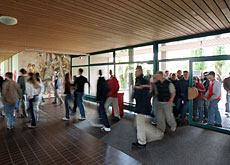How training could solve redundancy woes

With recession knocking on the door, Swiss experts have been considering how best to prepare for the social and financial fallout of unemployment.
Education and training, they say, are key for riding out the current crisis and for being well placed when the economy starts to recover.
Switzerland has been through a period of growth in recent years. Since 2001 its gross domestic product (GDP) has risen each year and 300,000 jobs have been created.
But non-governmental organisation Caritas says that there has been no corresponding fall in the number of those unemployed or receiving benefits during this time.
“Switzerland is not well prepared for the economic slowdown of the next few years,” said its president Fulvio Caccia.
Caritas is worried about the effects of higher unemployment among young people and the unskilled, as well as the financial consequences for welfare and benefits.
There are already signs that the economy is beginning to bite. In January this year the jobless rate rose to 3.3 per cent, the highest it has been for two years – although well below the European average.
At a recent symposium organised by Caritas in the Swiss capital, Bern, experts agreed that Switzerland would have to act differently if it wanted to avoid the mistakes of the past.
Education, education, education
“It’s important not to resort to structural solutions when dealing with an economic problem like unemployment,” Giuliano Bonoli, a professor at the Swiss Graduate School of Public Administration in Lausanne, told the conference.
“During previous crises, some European countries put many workers into early retirement or onto disability benefit; when the economy recovered these people were no longer available for the job market.”
He believes that Switzerland should concentrate on ensuring that people do not suffer the negative consequences of being without a job, including a loss of skills and self-esteem.
For this a change is needed – less emphasis on getting people straight back into work and more on measures to promote training, said the professor.
“If we manage to come out of this crisis with a population that is, on average better, trained, Switzerland will really be in a good position to benefit fully from the economic recovery,” Bonoli added.
Danish example
Denmark was an interesting example, he said. During the country’s last major recession in the 1990s, the jobless rate was 12.8 per cent.
“The government encouraged workers to take a year’s training break and their bosses to hire the unemployed as a replacement,” said Bonoli.
“The workers’ level of training improved, while the unemployed were able to keep in contact with the workplace.”
Boris Zürcher, an economist at the think tank Avenir Suisse, also believes that education will play a big role in the future.
“Demand for less qualified workers will fall, while it will rise for people with more training,” he said.
Health and wellbeing
Zürcher sees potential here for the health, teaching and wellbeing sectors. The finance, insurance, telecommunications and transport branches, which have already witnessed a rise in productivity, are more likely to stagnate.
But what about the many people – including many foreigners – who only have basic qualifications?
For Pascale Bruderer, a centre-left Social Democrat parliamentarian, training should be extended to give “young people who find school challenging, but have a practical bent, a chance to gain a qualification”.
Bruderer added that equal opportunities should be promoted early on. “By providing children with a solid linguistic and social basis, the chances are that one day we’ll have responsible and autonomous young adults,” she said.
Foreigners
Also in need of help, says Caritas, are children from low-income families, which include many foreigners. Those without qualifications are three times more likely to lose their jobs, it added.
Avenir Suisse’s Zürcher said that migrants’ work potential in Switzerland – a country of high integration and low unemployment – could be better exploited.
“People should be allowed to work more if they want, like in the United States, where thanks to immigrants, shops are now open 24 hours a day,” he said.
Philippe Ambühl, head of the “Integration for All” workplace integration foundation, says there should be special jobs, for example in hospitals, for those with social skills but who have few qualifications.
“But we will first have to ask ourselves if we are ready to invest in this type of change in society,” he warned.
swissinfo, based on an article in Italian by Luigi Jorio
Unemployment in Switzerland
2001: 1.7%
2004: 3.9%
2008: 2.6%
January 2009: 3.3%
GDP growth
2001: 1.2%
2004: 2.5%
2008: 1.9% (estimated)
2009 prediction: -0.8%
Benefit receivers
2004: 218,147 people (3% of population)
2006: 245,156 (3,3%)
(source: State Secretariat for Economic Affairs, Federal Statistics Office)

In compliance with the JTI standards
More: SWI swissinfo.ch certified by the Journalism Trust Initiative











You can find an overview of ongoing debates with our journalists here . Please join us!
If you want to start a conversation about a topic raised in this article or want to report factual errors, email us at english@swissinfo.ch.